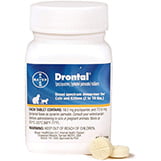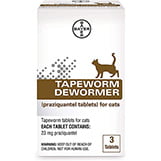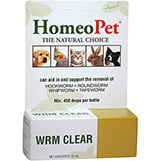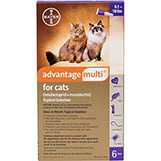Quick Comparison of Our Top 4 Picks
More Top Picks & Recommendations
- Best Topical Solution | Bravecto | Find on Chewy
- Best Chewable Tablet | Interceptor | Find on Chewy
- Best For Kittens | Revolution | Find on Chewy
Using a cat dewormer is an easy way to keep your feline friend safe from common worms, fleas, mites, and other parasites that may be silently causing harm to their health. All cats are susceptible to worms and other parasites, so pet owners need to regularly deworm indoor and outdoor cats and kittens as a preventative measure.
Not every dewormer works for all the worms cats can carry, and it is not one size fits all. In this guide to cat dewormers, we're breaking down everything you need to know about deworming your cat at home and highlighting the best cat dewormers on the market today. But first, let's take a look at some important information to know about worm infestations in cats.
How do cats get worms?
Cats can be exposed to worms and intestinal parasites in a number of ways. And while it's easy to assume that indoors-only cats are safe from infections, that's not quite the case.
The most common way cats get worms is by coming into contact with infected feces that contains eggs from fleas or parasites. When cats sniff or lick dirt or soil that contains these feces particles and microscopic eggs, they get passed into their system. Even just walking through or lying down in a contaminated area can cause some worms to penetrate through the skin.
Not to mention, cats constantly lick their paws and coat to groom themselves, making it easy for worms to make their way inside your cat's body. Flea infestations can also lead to intestinal parasites. When the cat eats a flea infected by tapeworms or other pesky parasites, the larvae make their way into your pet's digestive system.
Outdoor cats can also pick up worms from food that they hunt or scavenge. Rodents, birds, rabbits, and other small animals can be host to parasites' eggs. While these worms may be dormant in their original host, they'll become active again once they've made their way to your cat's intestines.
What are the most common types of worms in cats?
The most common types of worms in cats (and the ones your average deworming medication protects from) are:
- Roundworms— This common parasite lives in the intestines, leading to moderate digestive symptoms like excess gas, diarrhea, and a bloated appearance. Roundworms can also stunt a kitten's growth.
- Tapeworms— Tapeworms are particularly problematic, as some can be passed to humans and other animals. They can cause digestive problems like vomiting, stomach discomfort, poor digestion, and inadequate nutrition, leading to stunted kittens' growth. If you see something that resembles grains of white rice in your cat's feces in the litter box, or your cat is biting areas under their tail, they may have a tapeworm infestation.
- Hookworms— Another common intestinal parasite that attaches to the lining of the small intestine, where it feeds on the cat's blood. Hookworms often lead to anemia and skin infections.
- Whipworms— After burrowing themselves in the intestines, whipworms cause your cat's digestive system to lose a good deal of its nutrient-absorbing abilities. This leads to weight loss, restricted growth, lethargy, and overall poor health.
Some pet dewormers also protect against less common worms in cats, such as:
- Heartworms— Though uncommon, heartworms can be dangerous and lead to coughing, rapid breathing, vomiting, weight loss, and even sudden death. It's best to discuss your cat's heartworm prevention needs with your veterinarian as undiagnosed heartworms can be fatal. Heartworms spread by mosquitoes and reside in the major vessels of the lungs and heart.
- Lungworms— Another uncommon but serious worm that causes coughing, labored breathing, pneumonia, and respiratory distress or failure. They're common in outdoors cats that eat rodents or birds who've consumed infected slugs, snails, or other insects.
- Stomach and intestinal worms— Regular deworming can also help prevent against other less common worms that live in the stomach, intestines, and other parts of the digestive system.
- Liver flukes— This parasitic worm is particularly concerning, as it lives in water and can be spread to humans, where it can lead to liver disease. Plus, liver flukes often remain asymptomatic in cats or cause only mild to moderate digestive issues.
What are the symptoms of worms and intestinal parasites in cats?
One of the many dangerous things about worm infestations is that they don't always present severe digestive symptoms. Plus, symptoms can vary widely based on the specific type of worm. While some cats can be entirely asymptomatic, others will show the following signs of worms in cats:
- Overall poor appearance and dull coat
- Poor appetite and weight loss
- Vomiting (worms may be present in vomit)
- Diarrhea or bloody stool
- Distended abdomen
- Weakness and lethargy
- Dehydration
- Skin lesions
Left untreated, these can lead to more severe digestive symptoms, other health problems, shock, and even death. It's critical for pet parents to contact their veterinarian right away if they suspect a worm infestation. If you suspect your cat may have worms, bring your cat's stool sample to your veterinarian's office for evaluation for the presence of parasite eggs or larva.
Can I deworm my cat myself?
The good news is, you can avoid the need for expensive vet bills altogether by using a cat dewormer at home. Deworming medications are available both over-the-counter and by prescription. Oral dewormers come as pastes, liquids, and chewable tablets that are relatively easy to administer. Just like a preventive flea medication, topical deworming medications are applied at the neck and base of the head. You'll need to administer a dose every one to two months for most products to be effective.
What are the best cat dewormers?
When it comes to pet dewormers, there are two types: broad-spectrum dewormers that provide coverage from a range of worms and worm-specific options designed to target a single type of parasite. Different active ingredients offer different benefits and side effects, so you'll want to talk with your vet to determine what type of dewormer is best for your cat's needs before purchasing and administering any deworming products.
Bayer Drontal Broad Spectrum Dewormer for Cats and Kittens
Best Broad Spectrum Dewormer
overall
Price
$$$$$
Easy To Swallow
Flavor
Ease Of Use
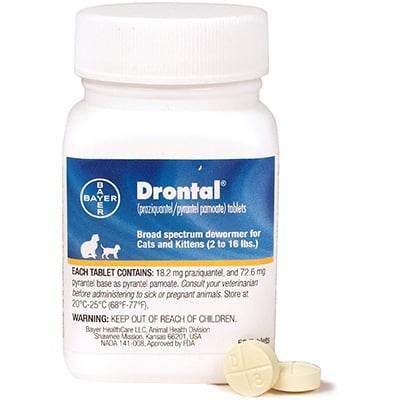
This popular Bayer Drontal Broad Spectrum Dewormer for Cats and Kittens is the best dewormer for broad-spectrum coverage from the most common worms. The monthly tablet protects cats and kittens over one month and 1.5 lbs from tapeworms, roundworms, and hookworms using praziquantel and pyrantel pamoate. It's reliable, easy to dose, and comes with minimal side effects compared to other broad-spectrum dewormers. Another major perk is that, unlike many other medications, it doesn't require a prescription from your vet. Just administer one tablet per 4-8 lbs of body weight by mouth or inside a pill pocket or enticing treat.
Delivery Form
Tablet
Age
Adult and Kitten
What We Like
What We Don't Like
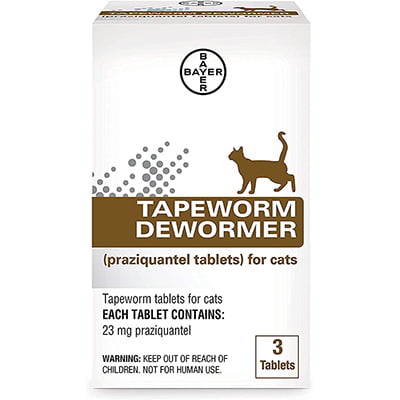
Bayer's Expert Care Tapeworm Dewormer for Cats and Kittens offers an easy and effective way to remove common tapeworms like Dipylidium caninum and Taenia taeniaeformis in a single dose. Each bottle contains three praziquantel tablets that can be taken with food or administered orally. While it can effectively treat tapeworms caused by fleas, you'll need to use another medication to treat the fleas themselves.
Delivery Form
Tablet
Age
cats over 6 weeks of age
What We Like
What We Don't Like
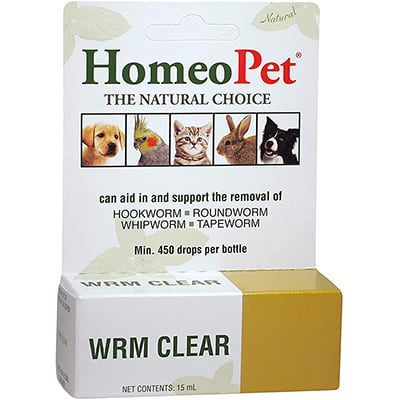
Looking for a more natural way to remove parasites and prevent them from coming back? Skip ineffective home remedies and try the HomeoPet Worm Clearer. The all-natural, fast-acting liquid can support the removal of hookworms, roundworms, and tapeworms— all without synthetic ingredients and toxic chemicals. It doesn't kill the worms themselves but instead helps the animal's immune system remove them naturally. In addition to cats, the natural dewormer can also be used on dogs, birds, rabbits, hamsters, ferrets, and pot-bellied pigs.
Delivery Form
Liquid
Age
Kitten and Adult
What We Like
What We Don't Like
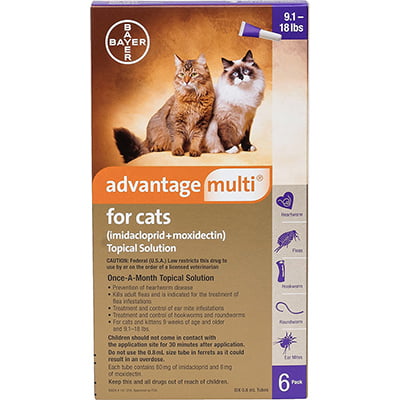
If you've got more than one cat roaming around your house, backyard, or barn, you'll need a deworming treatment with enough doses to protect them all. Advantage Multi Topical Deworming Solution for Cats is a once-a-month topical solution that your veterinarian can prescribe to kill adult worms and prevent future infestations. The broad-spectrum dewormer offers protection from fleas, ear mites, roundworms, hookworms, and heartworms using imidacloprid and moxidectin.
Delivery Form
Topical
Age
Kitten over 2 pounds
What We Like
What We Don't Like
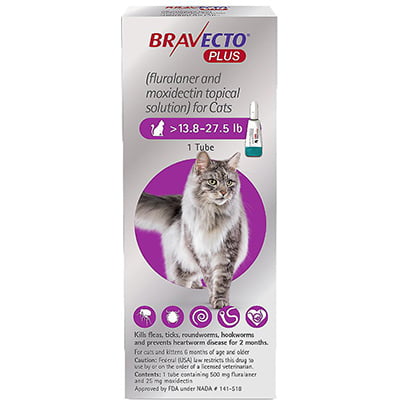
This Bravecto Plus Topical Solution for Cats provides two months of protection against fleas, ticks, heartworm, and intestinal parasites using fluralaner and moxidectin. The topical application comes in a handy tube that makes it easy to apply the product on squirming outdoor cats. Just squeeze the tube to apply the solution directly to the cat's skin on the base of their skull. No oral tablets are required! But heads up, you'll need to get a prescription from your veterinarian to order.
Delivery Form
Topical
Age
Kitten over 2.6 pounds
What We Like
What We Don't Like
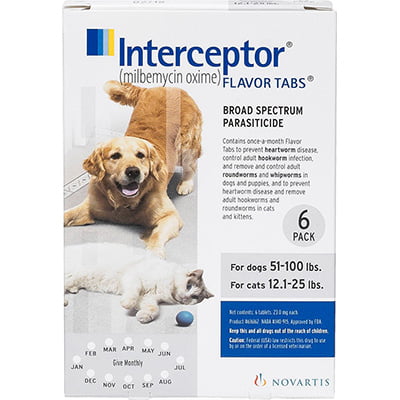
Interceptor's Chewable Deworming Medication Tablet for Dogs and Cats is one of the best chewable deworming tablets on the market. A veterinarian can prescribe the broad-spectrum parasiticide to help prevent heartworm disease and treat and control roundworms, hookworms, and whipworms in adult cats and dogs. It relies on milbemycin oxime, a power dewormer that you'll need to administer monthly for proper protection from parasites. Unlike many other chewable tablets, it's made with a tasty flavor that dogs and cats love, so you won't need to hide it in a pill pocket or forcefully (but lovingly) shove it down your furry friend's throat.
Delivery Form
Chewable tablet
Age
Kitten over 1.5 pounds
What We Like
What We Don't Like
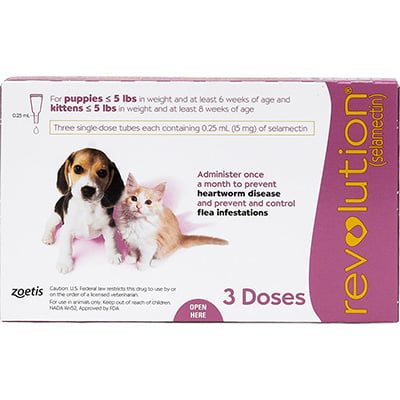
Kittens and puppies weigh less than their adult counterparts, so they won't need as large of a dose. Just a small amount will do. Revolution's Topical Solution for Kittens and Puppies was designed with small furry friends in mind. The once-a-month topical dewormer effectively treats heartworms, roundworms, hookworms, ear mites, and fleas. Regular application of the selamectin solution can help prevent infestations from ever happening in the first place.
Delivery Form
Topical
Age
Kitten at least 8 weeks of age and below 5 pounds
What We Like
What We Don't Like

